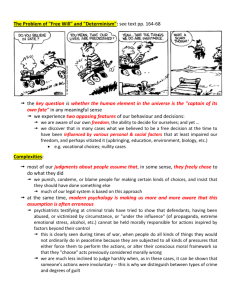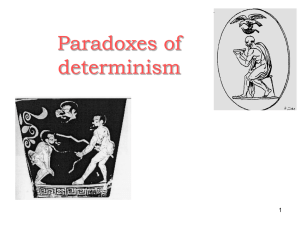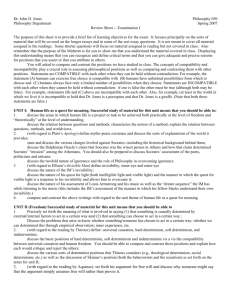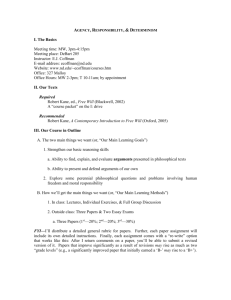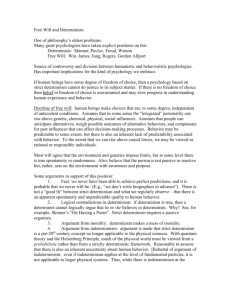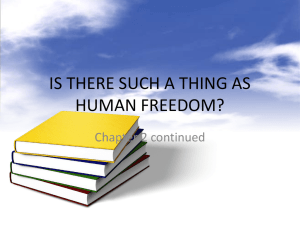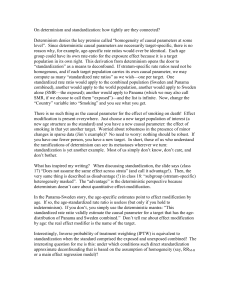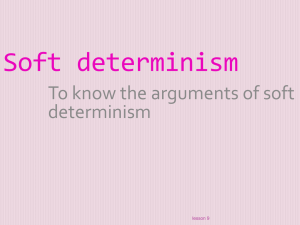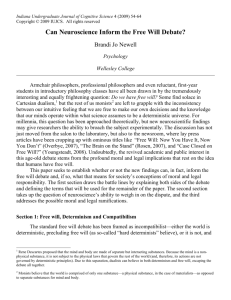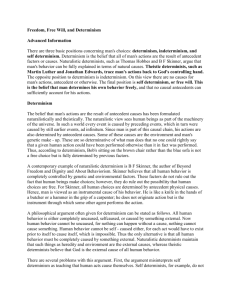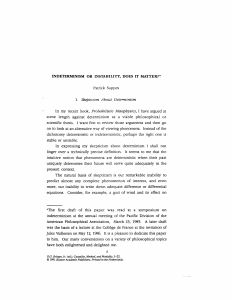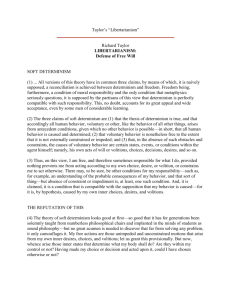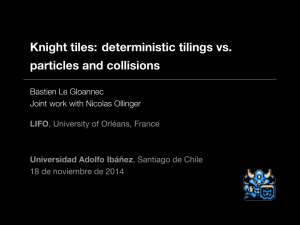Free Will versus Determinism
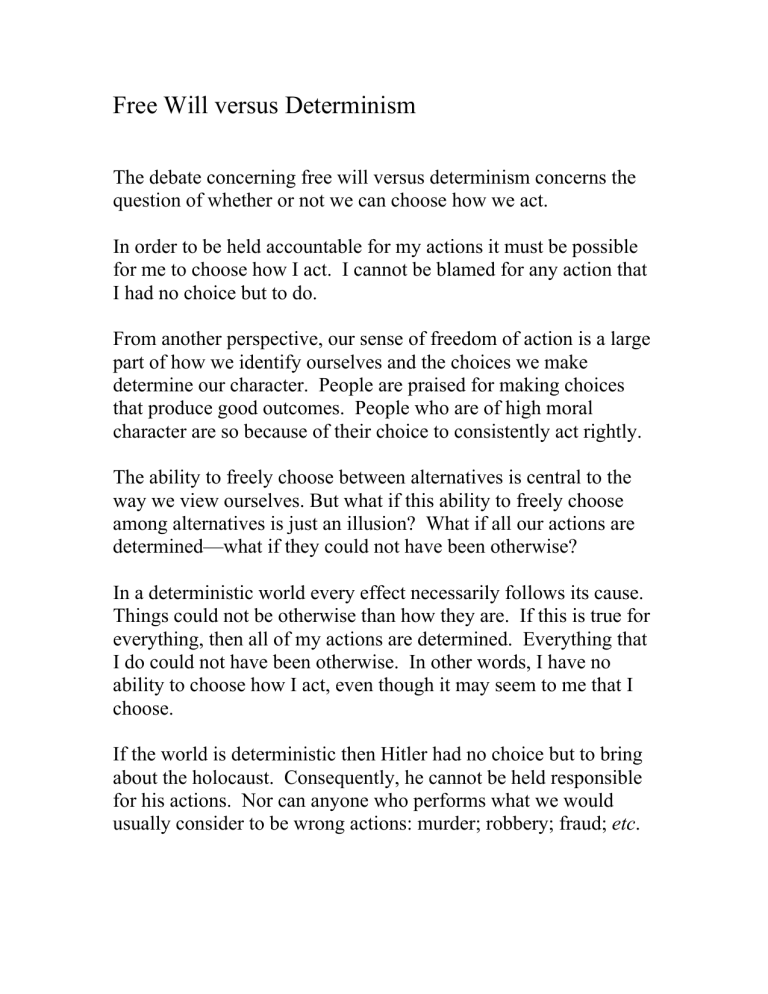
Free Will versus Determinism
The debate concerning free will versus determinism concerns the question of whether or not we can choose how we act.
In order to be held accountable for my actions it must be possible for me to choose how I act. I cannot be blamed for any action that
I had no choice but to do.
From another perspective, our sense of freedom of action is a large part of how we identify ourselves and the choices we make determine our character. People are praised for making choices that produce good outcomes. People who are of high moral character are so because of their choice to consistently act rightly.
The ability to freely choose between alternatives is central to the way we view ourselves. But what if this ability to freely choose among alternatives is just an illusion? What if all our actions are determined—what if they could not have been otherwise?
In a deterministic world every effect necessarily follows its cause.
Things could not be otherwise than how they are. If this is true for everything, then all of my actions are determined. Everything that
I do could not have been otherwise. In other words, I have no ability to choose how I act, even though it may seem to me that I choose.
If the world is deterministic then Hitler had no choice but to bring about the holocaust. Consequently, he cannot be held responsible for his actions. Nor can anyone who performs what we would usually consider to be wrong actions: murder; robbery; fraud; etc .
Morality presupposes free will, since a person must have chosen to act in a certain way for her action to be considered right or wrong.
Thus, if determinism is true, then morality is vacuous—there is no reason to say that people should do any one thing rather than another, since they have no choice but to act as they do.
But why would anyone think that the world is deterministic?
Prof. Thorp raised four ways of arguing that the world is deterministic: divine foreknowledge; the laws of logic; psychological laws; and physical laws.
Divine Foreknowledge:
If God exists and is omniscient, then God knows everything that you do in your entire life, past, present and future. Why does divine foreknowledge of the events and actions in the universe lead to an argument for determinism? Is there any way that divine foreknowledge could be consistent with us having free will?
Laws of Logic:
One of the classical laws of logic is the law of excluded middle. It asserts that each proposition is either true or false, there are no other possibilities. Why does this logical law lead to an argument for determinism? Is there a way to escape this conclusion? If so, can you think of any reasons why we should make this escape?
Psychological Laws:
We make our decisions based on competing motives, drives and desires. These are not chosen by us. Where do these competing forces come from? How does the observation that we make decisions in this way lead to an argument for determinism? Is it possible to escape the conclusion that our actions are determined in this way?
Physical Laws:
Most physical laws are deterministic, which means that if the state of a system is specified at one time, then its behaviour is determined for all times. If the physical world is deterministic, how does this lead to an argument that our actions are determined?
How is it possible to escape the conclusion that our actions are determined in this way?
Let’s take a look at a couple of the arguments against determinism considered by Blanshard.
One of these is that the physical world is no longer thought to be deterministic. According to some interpretations of quantum mechanics certain events are essentially random—it is not possible to specify a cause to the effect. An example of this is radioactive decay. There is no causal mechanism governing the emission of particles from an unstable nucleus. It is impossible (even in principle) to predict when a particular radioactive atom will decay.
Does the existence of such processes have any effect on whether we can be considered to have free will?
In order for us to have free will, the mind must be able to guide or effect physical processes. The uncertainty and randomness of quantum mechanics doesn’t explain how we should have this ability—the indeterminate events are random. We move from hard determinism to randomness. The randomness of quantum events does not admit of control by the mind.
As Prof. Thorp said, “determinism precludes freedom, but indeterminism does not secure it.” The world must be indeterministic in order for us to have free will, but the indeterminate effects cannot just be random.
Stated otherwise, indeterminism is a necessary but not sufficient condition for freedom.
Given that the world is indeterministic, what ability do we need to have in order to have freedom of action? What needs to be true about our decisions?
The position that holds that the world is indeterministic and we have genuine open alternatives to us—in situations where we are not constrained, we could have acted otherwise—is called libertarianism .
Libertarianism is contrasted with hard determinism which a position that holds that all actions are necessary consequences of preceding causes. On such a view there is no freedom and no basis for moral responsibility.
What is the position intermediate to these two?
How can determinism be compatible with free will?
What is the difference between freedom of spontaneity and freedom of indifference ?
In the case of freedom of spontaneity our actions are free. We are able to act as we will but we are not free to will what we will. An agent with freedom of spontaneity acts of her own free will—she is not constrained to act as she does, but she nevertheless could not have acted otherwise.
Freedom of spontaneity can be considered to be sufficient for moral responsibility since the agent is able to guide or bring about what she wills. Even though she could not have acted otherwise, her actions are traced back to her will.
Why is freedom of spontaneity compatible with determinism?
In the case of freedom of indifference (as it is often construed) our decisions or acts of will are free. In this case we are able to will what we will. An agent with freedom of indifference acts with a will that is free. In this case she could have acted otherwise than she did—the future has genuinely open alternatives (branches).
How can freedom of indifference be compatible with determinism?
